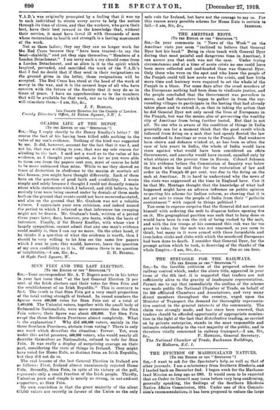SINN FEIN AND THE LAST ELECTION.
[To THE EDITOR OF THE " SPECTATOR."] gin,—Your correspondent Mr. A. T. Rogers asserts in his letter in your last issue that " at the last General Election 75 per cent. of the Irish electors cast their votes for Sinn Fein and the establishment of an Irish Republic." This is contrary to fact. The truth is that Sinn Fein got a very small proportion of the total voting strength of Ireland. In round numbers the figures were 400,000 votes for Sinn Fein out of a total of 1,401,000. The Unionist voters, together with the small body of liedmond;te Nationalists, were more numerous than the Sinn Fein voters; their figure was about 430,000. Yet Sinn Fein swept the three Southern Provinces almost completely. What is the explanation ? Why did 600,000 voters, mainly in the three Southern Provinces, abstain from voting ? There is only one word which describes the situation: Terror. Yet, even ander this awful pressure, 600,000 voters, who would nearly all describe themselves as Nationalists, refused to vole for Sinn Fein. It was really a display of surprising courage on their part, considering the state of things in Ireland. They might have voted for Home Rule, as distinct from an Irish Republic, but they did not do so.
The real lessons of the last General Election in Ireland are as follows: First, Ireland almost unanimously rejected Home Rule. Secondly, Sinn Fein, in spite of its victory at the poll, represents only a small fraction of the Irish people. Thirdly, tnionism pure and simple is nearly as strong, in out-and-out sepporters, as Sinn Fein.
My own conviction is that the great majority of the silent 613,603 voters are secretly in favour of the Union as the only safe rule for Ireland, but have not the courage to say so. For this reason every possible scheme for Home Rule is certain to


























 Previous page
Previous page